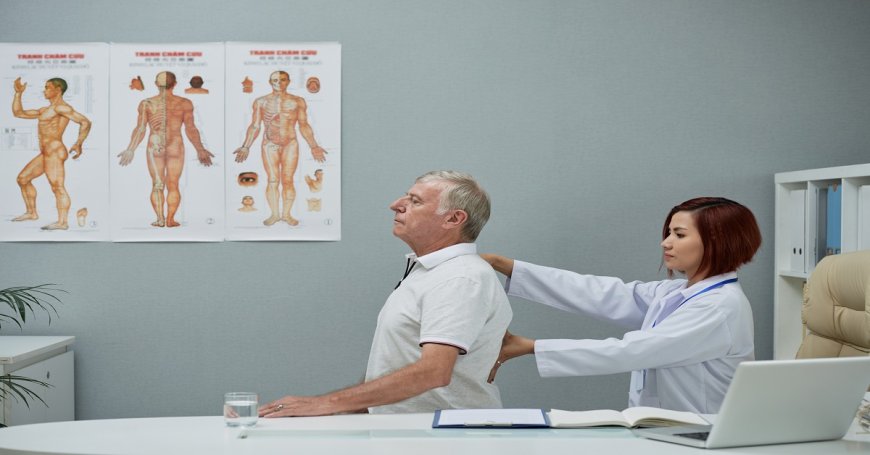Finding Relief with a Back Pain Specialist
Back pain can be a debilitating condition that significantly impacts your quality of life. However, with the help of a back pain specialist, you can find effective solutions tailored to your needs.
Back pain is a common ailment affecting millions of people worldwide, disrupting daily life and diminishing quality of life. While some cases of back pain are temporary and can be alleviated with simple home remedies, others require the expertise of a specialist to diagnose and treat underlying conditions effectively. If you’ve been struggling with persistent or severe back pain, seeking the help of a back pain specialist could be the key to reclaiming your health and comfort.
Understanding the Role of a Back Pain Specialist
A back pain specialist is a medical professional with advanced training and expertise in diagnosing and treating various conditions that cause back pain. These specialists can include chiropractors, physiatrists, orthopedic surgeons, neurologists, and pain management doctors. Each type of specialist brings unique skills and approaches to treating back pain, ensuring that patients receive comprehensive care tailored to their specific needs.

Common Causes of Back Pain
Back pain can result from numerous factors, including poor posture, muscle strain, injury, or underlying medical conditions. Some of the most common causes of back pain that a specialist might encounter include:
-
Muscle or Ligament Strain: Unsupported heavy lifting or sudden accidents can strain back muscles and spinal ligaments especially. Poor physical condition can lead to constant strain, causing painful muscle spasms.
-
Herniated or Bulging Discs: When these discs become damaged or displaced, they can press on nerves, resulting in pain, numbness, or weakness in the back and limbs.
-
Arthritis: Osteoarthritis can affect the lower back. In some cases, arthritis in the spine can lead to a narrowing of the space around the spinal cord, a condition called spinal stenosis.
-
Osteoporosis: This condition causes bones to become brittle and porous, leading to painful fractures in the spine's vertebrae.
-
Scoliosis: An abnormal curvature of the spine can lead to back pain over time.
Diagnosis and Evaluation
When you visit a back pain specialist, the first step is a thorough evaluation to determine the cause of your pain. This process typically includes:
-
Medical History: The specialist will ask about your symptoms, lifestyle, previous injuries, and any medical conditions that might contribute to your back pain.
-
Physical Examination: This involves assessing your range of motion, reflexes, and muscle strength. The specialist might also check for areas of tenderness or numbness.
-
Diagnostic Tests: Depending on your symptoms, the specialist may order imaging tests such as X-rays, MRI scans, or CT scans to get a detailed view of your spine and identify any abnormalities.
-
Nerve Studies: If nerve compression is suspected, electromyography (EMG) or nerve conduction studies might be performed to assess nerve function.
Treatment Options
Once the back pain specialist has identified the cause of your pain, they will develop a personalized treatment plan. Treatment options can vary widely depending on the diagnosis and may include:
-
Physical Therapy: A cornerstone of back pain treatment, physical therapy involves exercises and stretches to improve mobility, strengthen the back muscles, and relieve pain. Therapists may also use techniques such as ultrasound, electrical stimulation, and heat or ice therapy.
-
Medications: Depending on the severity of your pain, your specialist might recommend over-the-counter pain relievers, anti-inflammatory drugs, muscle relaxants, or even prescription medications.
-
Chiropractic Care: Chiropractors use spinal manipulation and other manual techniques to improve spinal alignment and relieve pain. This approach is often effective for treating mechanical back pain.
-
Injections: For some patients, corticosteroid injections or nerve blocks can provide significant relief by reducing inflammation and numbing pain.
-
Surgery: In severe cases where conservative treatments are ineffective, surgical options such as discectomy, laminectomy, or spinal fusion may be considered. Surgery is usually a last resort and is only recommended when necessary to alleviate debilitating pain or prevent further damage.
-
Lifestyle Modifications: Specialists often advise patients on lifestyle changes to prevent future back pain. This can include ergonomic adjustments, weight management, and regular exercise routines tailored to individual needs.
The Importance of a Multidisciplinary Approach
One of the key advantages of seeking help from a back pain specialist is the access to a multidisciplinary approach to treatment. Chronic back pain often requires a combination of therapies and interventions for effective management. A multidisciplinary team may include:
-
Physical Therapists: Experts in rehabilitation and exercise therapy to restore movement and function.
-
Pain Management Specialists: Physicians who specialize in managing chronic pain using a variety of medical and interventional techniques.
-
Orthopedic Surgeons: Surgeons who specialize in surgical interventions for spinal issues.
-
Neurologists: Doctors who focus on the nervous system and can diagnose and treat conditions involving nerve pain.
-
Chiropractors: Healthcare professionals who use spinal manipulation and other hands-on techniques.
This collaborative approach ensures that patients receive comprehensive care, addressing all aspects of their condition and promoting optimal recovery and pain relief.
Preventing Back Pain
While not all back pain is preventable, there are steps you can take to reduce your risk:
-
Maintain Good Posture: Proper alignment of your spine reduces stress on your back muscles and ligaments.
-
Exercise Regularly: Strengthening the muscles that support your back, such as the core muscles, can help prevent injuries.
-
Healthy Weight: Maintaining a healthy weight reduces the strain on your back and lowers the risk of developing back pain.
-
Quit Smoking: Smoking impairs blood flow to the spine and increases the risk of degenerative spinal disorders.
Conclusion
Back pain can be a debilitating condition that significantly impacts your quality of life. However, with the help of a back pain specialist, you can find effective solutions tailored to your needs. From accurate diagnosis to comprehensive treatment plans, these specialists offer the expertise and care necessary to help you manage and overcome back pain. Don’t let back pain control your life, seek out a specialist and take the first step towards a pain-free future.
What's Your Reaction?


























